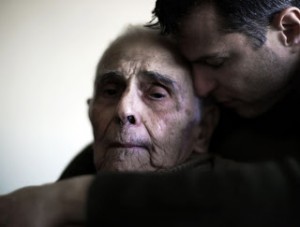A recent publication in the medical journal Neurology by Dr. Susan Resnick revealed a surprise link between a lack of testosterone and Alzheimer’s disease.
574 men from the Baltimore Longitudinal Study of Aging who had been followed for about 19 years were analyzed with respect to hormonal factors and their neurological status was also observed. Of these men who ranged in age from 32 to 87 years initially 54 were diagnosed with Alzheimers disease.
When the researchers looked at the hormone status of the men whose mental functioning stayed stable versus those who developed Alzheimers, it was clear that the height of the free testosterone level in the blood (expressed by dividing testosterone by the sex hormone-binding globulin) was a significant predictor for not getting Alzheimers. In other words, if men could maintain a stable level of free testosterone with aging they were significantly protected from Alzheimers disease. The effect was so marked that the blood test could predict 10-years in advance whether a man would develop Alzheimers in future or not. There was a 26% reduction in the risk of Alzheimers with each 10-unit increase in free testosterone.
The same edition of Neurology contains a second report by Dr. Gian Benedetto Melis and coworkers (University of Cagliari, Italy) where around 100 patients (males and females) with Alzheimers were compared with a similar number of patients without Alzheimers. All of their body mass index was in the normal range (20 to 22). These researchers found that the Alzheimers group (both male and female) had an extremely high sex hormone-binding globulin.
The testicles in males and the adrenal glands in males and females can produce testosterone. Dr. Resnick remarked that free testosterone can enter the brain tissue (via the blood brain barrier) easily and act directly on the brain or can be converted to estrogen. Estrogen has been shown in other studies to have a protective effect against Alzheimers. Dr. Resnick cautioned that another study where males with low testosterone levels are getting testosterone supplementation has to be done first before a male should be advised to get treated with testosterone for prevention of Alzheimers disease.
This article is based on a publication by Dr. Resnick et al. in Neurology 2004;62:188-193,301-303.
Comments: It is interesting to note that the “old fashioned” remedies such as weight loss, exercise (particularly anaerobic exercises such as weight training) and a low glycemic diet will naturally increase testosterone levels and vitality in both sexes. A comprehensive program such as the zone diet (by Dr. Barry Sears) or a similar such low glycemic program when combined with exercise will automatically make you lose weight down to a normal body mass index and allow you to maintain it without hunger pangs. It will also normalize hormones in most people on its own as previously elevated insulin levels normalize and the sex hormone-binding globulin will normalize as well. This will make the necessary hormones available to you whether female or male, will prevent osteoporosis (from exercise) and provide enough hormones before and after menopause or andropause to most people. Only a minority of patients will need to get blood tests from their doctors depending on symptoms and those need to seek medical advice to see whether they might benefit from bioidentical hormone replacement therapy.
Further information can be found here: bioidentical hormone replacement.
Last edited October 26, 2014






